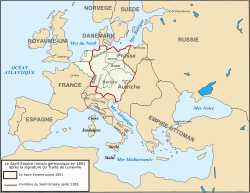Congress of Lunéville
| Treaty of Peace between France and the Emperor of Germany | |
|---|---|

Europe after Lunéville
|
|
| Type | Peace treaty |
| Context | War of the Second Coalition |
| Signed | February 9, 1801 |
| Location | Lunéville, France |
| Signatories | |
The Treaty of Lunéville was signed in the Treaty House of Lunéville on 9 February 1801. The signatory parties were the French Republic and Holy Roman Emperor Francis II. The latter was negotiating both on his own behalf as ruler of the hereditary domains of the Habsburg Monarchy and on behalf of other rulers who controlled territories in the Holy Roman Empire. The signatories were Joseph Bonaparte and Count Ludwig von Cobenzl, the Austrian foreign minister.
The Austrian army had been defeated by Napoleon Bonaparte at the Battle of Marengo on 14 June 1800 and then by Jean Victor Moreau at the Battle of Hohenlinden on 3 December. Forced to sue for peace, the Austrians signed another in a series of treaties. The treaty, along with the Treaty of Amiens of 1802), marked the end of the Second Coalition against the French First Republic. The United Kingdom was the sole nation still at war with France for another year.
The Treaty of Lunéville declared that "there shall be, henceforth and forever, peace, amity, and good understanding" among the parties. The treaty required Austria to enforce the conditions of the earlier Treaty of Campo Formio (concluded on 17 October 1797). Certain Austrian holdings within the borders of the Holy Roman Empire were relinquished, and French control was extended to the left bank of the Rhine, "in complete sovereignty" but France renounced any claim to territories east of the Rhine. Contested boundaries in Italy were set.
...
Wikipedia
